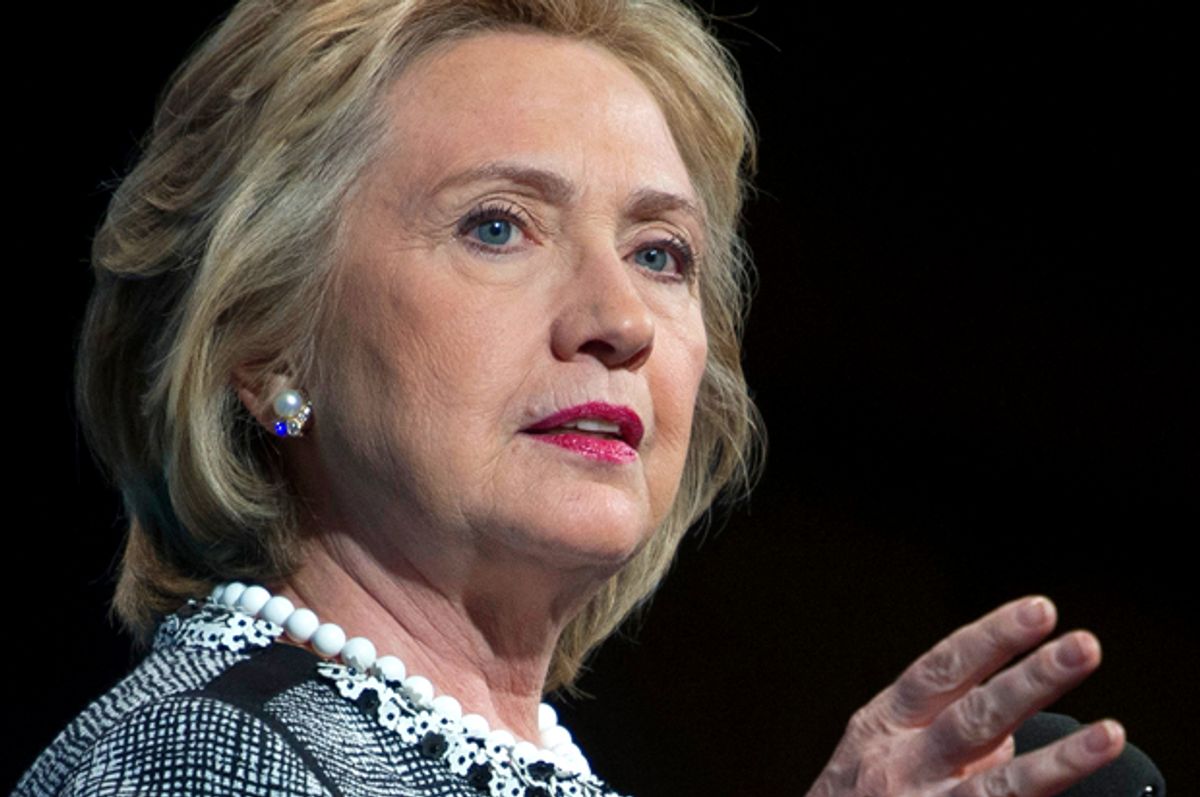Like most of the rest of the Democratic Party, Hillary Clinton is now spending time talking about women and labor. The New York Times has a piece on Clinton's apparent pivot -- now that we have entered the final months of speculation about whether or not she'll run for president -- from talking about foreign policy to discussing domestic issues like the minimum wage and paid sick leave. And over at Vox, Matthew Yglesias pointed out something that's been true for a long time, but is just now gaining mainstream traction: The division between "social issues" and "economic issues" is completely made up. But contrary to Yglesias' framing of this move as some kind of experiment to influence voters ("Hillary Clinton's plan to use feminism to sell big government"), it seems to me that Clinton is actually just going where the public has led her.
Clinton doesn't need to make the case that there are real structural barriers keeping them from earning the money they need to survive or that government programs that support women and families are shrinking. Women already know. Polling data reflects women's concerns about the economy, which is exactly what Clinton is responding to. As Yglesias noted, Clinton, speaking on a panel this week, articulated a connection that feminists, particularly feminists in the labor and reproductive justice movements, have long been making. "Women hold two-thirds of all minimum wage jobs," she said. "We talk about a glass ceiling, but these women don't even have a secure floor under them."
And this lack of a secure floor touches every part of women's lives. Which is why, when you apply a little pressure, the idea that women's "social" and "economic" can be separated out falls away pretty quickly.
One in 3 women are living in or on the verge of poverty, and are holding down two out of every three minimum wage jobs. More than 25 percent of low-wage and low-income workers are also single mothers. That means a woman who works full-time is only making an average of $14,500 each year. That’s $4,000 dollars less than the poverty level for a mother of two children.
So what other issues might this woman, heading a household and working a minimum wage job, confront in her daily life? If she's living in poverty, she's likely facing food insecurity. And food assistance programs like SNAP were cut this year, so she's now working with less than before. Which probably means she's skipping meals. “What we find in our research is that when someone is going to have to do without, it’s usually women,” Lindsey Spindle, a communications officer at an anti-hunger nonprofit recently told Glamour. “They sacrifice their meals for their children, for their spouse, for their parents. So what we’re anticipating with these cuts is that families will be left vulnerable, but women in particular will do a lot to shield their families.” Which might help explain why a recent poll revealed that 56 percent of women surveyed “disapproved” or “strongly disapproved” of gutting food assistance programs at a moment when people need them more than ever. Or why 61 percent of women surveyed said that widening income gaps undermine opportunity.
And this hypothetical woman, struggling as she is to support her family, might also be thinking about ways to avoid pregnancy. So she's probably paying attention when the Supreme Court says that her boss can dictate what methods of contraception she should have access to. And she's paying attention when her state rejects the Medicaid expansion. Or when her representatives target family planning clinics that provide basic healthcare like abortion, contraception or cancer screenings. Because those are things she's struggling to afford, right along with housing and food.
Democrats have been smart to focus their platforms on the challenges women face in their daily lives, and to follow women's lead in breaking down divisions between "social" issues like reproductive healthcare and "economic" issues like a living wage or universal preschool. (In fact, it seems the only candidates currently holding tight to that false division are Republicans trying to find favor with women voters by talking about anything but their platforms on contraception.) So while Yglesias gets it right that this is indeed Clinton's strategy, I don't think it's Clinton who's planning to "use feminism" to sell a more robust social safety net. I think it's feminism -- and the power of women's votes -- using Clinton.

Shares